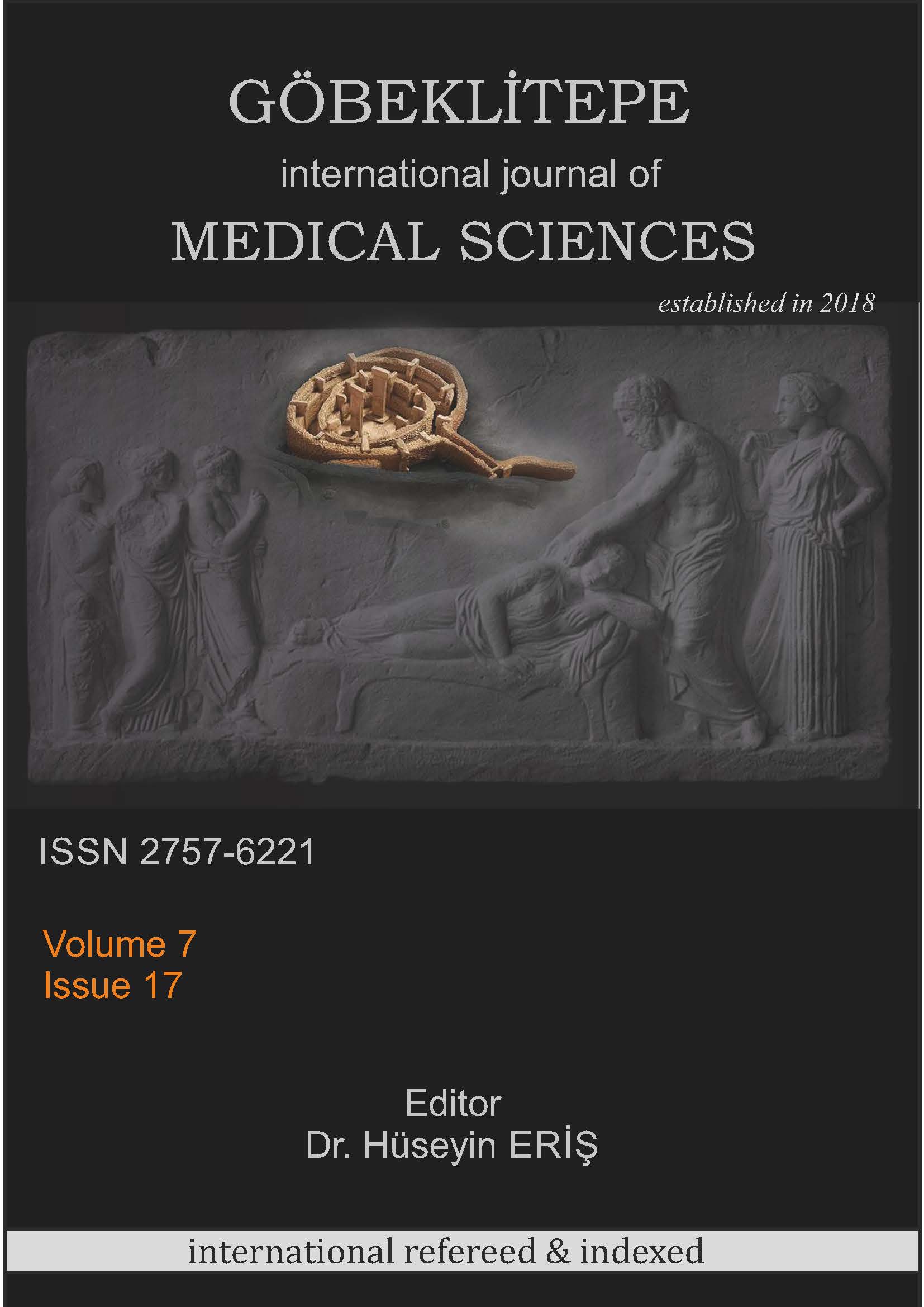HEMŞİRELİK ÖĞRENCİLERİNİN METAVERSE İLE İLGİLİ BİLGİ VE TUTUMLARININ İNCELENMESİ
Anahtar Kelimeler:
Hemşirelik, Öğrenci, Metaverse, Bilgi Düzeyi, TutumÖzet
Bu araştırma hemşirelik öğrencilerinin metaverse ile ilgili bilgi ve tutumlarının incelenmesi incelemek amacıyla tanımlayıcı nitelikte yapıldı. Bu çalışma 1 Aralık 2022 -15 Ocak 2023 tarihleri arasında Türkiye’de bir devlet bir üniversitesinin sağlık bilimleri fakültesindeki hemşirelik öğrencilerine tanımlayıcı nitelikte yapıldı. Araştırma verileri soru formu ve metaverse ölçeği kullanılarak toplandı. Veriler SPSS 25,0 programı ile verilerin analizi yapıldı.Çalışmaya katılan öğrencilerin %71,2’sinin kadın, %28,8’inin erkek, %81,4’ünün ders çalışırken teknolojik araç olarak cep telefonu kullandığı, %54.0’nün interneti günde 3-4 saat kullandığı, %56,2’sinin metaversin ne olduğunu bildiğini, %43,8’nin metaverse bilmediği ve %57.8’nin gelecekte metaversin hemşirelik eğitiminde ve hasta bakımında önemli yeri olacağını düşündüğü saptanmıştır. Metaverse ölçeği toplam puanı 50,94±12,12 (minimum 15-maksimum 75 puan) olarak saptanmıştır. Hemşirelik öğrencilerinin metaverse ölçeği puan ortalamasının yüksek düzeyde olduğu, belirlenmiştir. Öğrencilerin yaşadığı yer, sınıf, okuduğu lise, kullandığı teknolojik araçlar ve internette geçirdiği süre metaverse ile ilgili bilgi düzeyini etkileyen faktörler olarak belirlenmiştir.
Referanslar
Konukbay, D,. Efe, M.,&Yıldız, D. (2020). The Reflection of Technology on The Nursing Profession: A systematic review. University of Health Sciences Journal of Nursing.2(3).175-182. https://doi.org/10.48071/sbuhemsirelik.700870.
Tatlı, Z., Aydın, A, Şimşek. P., Özdemir, M., Gölbaşı, S., Karacan, S., Gürsoy, A., & Gündüz, A. (2018). The Use of Information Technologies by Nurses and Nursing Students. Ordu University Journal of Nursing Studies. 1(1). 18-27.https://www.researchgate.net/publication/332138781.
Akpınar Söylemez, B., Özgül, E., & Akyol, M.A. (2022). Küçükgüçlü Ö. Attitudes of Nursing Senior Students Towards The Use of Computers in Healthcare and Related Factors. Journal of Health and Nursing Management. 9(1).37-46. doi:10.54304/SHYD.2022.56933.
Soysal,G.E. (2021). İnvestıgation of The Relationship Between The İndividual İnnovativeness and Academıc Success in Nursıng Students. Abant Journal of Health Sciences and Technologies.1(1).1-9.
Savaş,B.Ç., Karababa,B., &Turan, M. (2022). Metaverse knowledge level: An Investigation on Physical Eeducation and Sport Teacher Candidates. Int Jour Exer Psyc. 2022; 4(1):18-29. https://doi.org/10.51538/intjourexerpsyc.1140 511.
Süleymanoğulları, M., Özdemir, A., Bayraktar, G., &Vural, M. (2022). Metaverse Scale: Study of Validity and Reliability. Anatolia Sport Research.3(1).47-58. doi: http://dx.doi.org/10.29228/anatoliasr.25.
Petrigna, L., Musumeci, G. (2022). Metaverse: A New Challenge for The Healthcare System: A Scoping Review.J Funct Morphol Kinesiol.7(3). 63. doi:10.3390/jfmk7030063.
Ali, S.,Abdullah., Armand, T.P.T., Athar, A., Hussain, A., Ali, M. et al. (2023). Metaverse in Healthcare Iintegrated with ExplainableAI andBlockchain: Enabling İmmersiveness. Ensuring Trust. and Providing Patient Data Security. Sensors. 23(2).565.https://doi.org/10.3390/s23020565.
Ağaoğlu, F.O., Ekinci, L.O., &Tosun, N. An Evaluation on Metaverse and Health Services. Erzincan Binali Yıldırım University Journal of Faculty of Economics and Administrative Sciences. 2022; 4(1):95-102. https://doi.org/10.46482/ebyuiibfdergi.1133902.
Chen, D.,& Zhang, R. (2022). Exploring Research Trends of Emerging Technologies in Health Metaverse: A Bibliometric Analysis. SSRN Electronic Journal.http://dx.doi.org/10.2139/ssrn.3998068.
Thomason, J. (2021). How will the Metaverse Change Health Care. Journal of Metaverse.1(1).13-16.
Frith, K.H. (2022). The Metaverse: Is It just trending or AReal Game Changer for Education? Nursing Education Perspectives. 43(6).384.https://doi.org/10.1097/01.NEP.0000000000001057.
Weiner, E., Gordon, J., &Rudy, S.R. (2019). Expanding Virtual Reality to Teach Ultrasound Skills to Nurse Practitioner Students. Stud Health Technol Inform.264. 893–7.doi: 10.3233/SHTI190352.
Sharma, M.,&Sharma, S. A. (2023).Holistic Approach to Remote Patient Monitoring. Fueled by ChatGPT and Metaverse Technology: The future of nursing education. Nurse Education Today.131.https://doi.org/10.1016/j.nedt.2023.105972.
Başol, Ş., Akman Dömbekci, H., Öztürk, Y.E. (2023). Health Services in The Metaverse Universe. IGUSABDER. 19. 275-289. https://doi.org/10.38079/igusabder.1139384.
Turan, M., Mavibaş, M., Savaş, B.Ç., & Çetin,H. (2023). The ınvestıgatıon of Physıcal Educatıon Teachers' Metaverse Knowledge Levels Accordıng to Varıous Varıables. The Online Journal of Recreation and Sports (TOJRAS).12(1).25-42. https://doi.org/10.22282/tojras.1201104.
Aburbeian, A.M., Owda, A.Y., &Owda, M.A (2022).Technology Acceptance Model Survey of The Metaverse Prospects. AI.3(2). 285–302. https://doi.org/10.3390/ai3020018.
Özdemir. A. Vural. M. Süleymanoğulları. M. and Bayraktar. G. (2022). What Do University Students Think About The Metaverse? Journal of Educational Technology & Online Learning. 5(4). 952-962. http://doi.org/10.31681/jetol.1151470.
Suh, W.,& Seongjin, A. (2022). Utilizing The Metaverse for Learner-Centered Constructivist Education in The Post-Pandemic Era: An Analysis of Elementary School Students. Journal of Intelligence. 10(1).17. https://doi.org/10.3390/jintelligence10010017.
Lee, M., Bin Mahmood, A.B.S., Lee, E.S., Smith, H.E., &Tudor Car, L. (2023). Smartphone and Mobile App Use Among Physicians in Clinical Practice: Scoping Review. JMIR Mhealth Uhealth.11.e44765. doi: 10.2196/44765.
Abolfotouh, M.A., BaniMustafa, A., Salam, M., Al-Assiri, M., Aldebasi, B.,Bushnak, I. (2019). Use of Smartphones and Perception Towards The Usefulness and Practicality of İts Medical Applications Among Healthcare Workers in Saudi Arabia. BMC Health Serv Res.19(1). 826. https:// doi.org/10.1186/s12913-019-4523.
Dost, A., Kökcü Doğan, A., & Aslan Huyar, D. (2021). Internet Addiction in Nursing Students. Ordu University J Nurs Stud. 4(3). 393-401. https://doi.org/10.38108/ouhcd.871550.
Akman Yılmaz, A., İzgü, N., Kav, S.,&Özhan Elbaş, N. (2017).Views and Practices of Nurses Working at İnternal Medicine Wards About Using The İnternet to Access Health-Related Information. Gümüşhane University Journal of Health Sciences. 6(4). 57-68.
Uygur, M.,Yelken, T.Y., &Akay, C. (2018). Analyzing The Views of Pre-Service Teachers on The Use of Augmented Reality Applications in Education. European Journal of Educational Research. 7(4). 849-860. https://doi.org/10.12973/eu-jer.7.4.849.
Talan, T.,&Kalınkara,Y. (2022). Students' Opinions About The Educational Use of The Metaverse. International Journal of Technology in Education and Science (IJTES). 6(2). 333-346. https://doi.org/10.46328/ijtes.385.
İndir
Yayınlanmış
Sürüm
- 2024-10-24 (2)
- 2024-09-28 (1)
Nasıl Atıf Yapılır
Sayı
Bölüm
Lisans
Telif Hakkı (c) 2024 Göbeklitepe Sağlık Bilimleri Dergisi

Bu çalışma Creative Commons Attribution 4.0 International License ile lisanslanmıştır.




